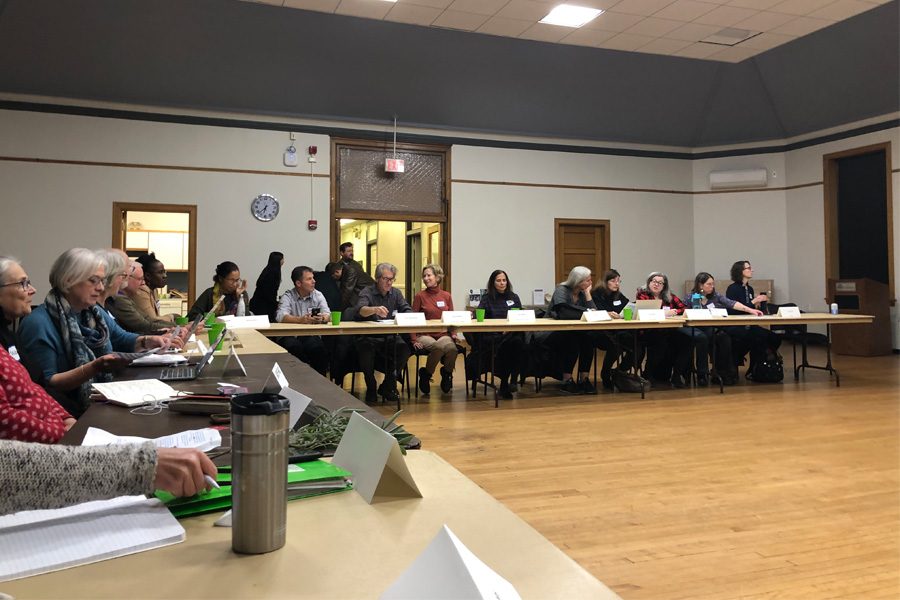Evanston organizations lay groundwork for carrying out CARP goals
Emma Edmund/Daily Senior Staffer
Organization representatives at Wednesday’s coordination meeting for the Climate Action and Resilience Plan. City staff held the meeting so Evanston organizations could come together and discuss possible collaborations to further CARP-related objectives.
November 7, 2019
Evanston city staff and organizations on Wednesday laid the groundwork for coordination on the city’s Climate Action and Resilience Plan.
City Council passed CARP, Evanston’s comprehensive guide against climate change, back in December 2018. Recently, Kumar Jensen, Evanston’s chief sustainability and resiliency officer, praised outreach as one of CARP’s biggest accomplishments in the months since its passing.
At the meeting, organizations ranging from Evanston Made to Citizens’ Greener Evanston floated ideas about tackling CARP objectives, such as the plan’s goal to make the city zero-waste by 2050.
The organizations expressed a need to figure out how they can help each other fulfill their individual goals, and Kathy Halper, an artist representing Evanston Made, suggested a Facebook group or website for organizations to post in and use to solicit help.
“I feel like you guys need a centralized location to express ‘this group is looking for this’ and ‘this group is interested in this,’” Halper said.
At the meeting, one attendee passed around a sign-up sheet for organizations interested in collaborating.
Organizations at the meeting discussed goals ranging from hyper-local to national. Laura Winston and Joan Muller from Evanston’s chapter of Citizens’ Climate Lobby called for the city to urge the national government for a carbon tax. Melanie West from Tiz Media Foundation, a nonprofit organization that offers services to educate and engage students, asked meeting attendees to help bring speakers to talk to students and to donate different parts, like solar panels, for fourth and fifth graders to tinker with and use.
“Our main thing is we want to help them feel empowered and use their voices,” West said. “They’re the ones who really have to deal with this stuff.”
Several people at the meeting pushed for more youth interaction. Sylvia Wooller from District 65 Green Teams mentioned that through Evanston/Skokie School District 65, people can reach 25 percent of Evanston residents. She said the organization, consisting mostly of working parents, can only focus on “low-hanging fruit,” such as composting and recycling in lunchrooms, and that they are also limited by the eight years their children are in the district. She asked attendees to help the green teams get the district more committed to implementing sustainable practices.
Some of the high schoolers who organized the September international climate strike at Fountain Square emphasized at the meeting how many young people in the city feel a sense of urgency around climate change.
Timothy Eberhart, a committee member of Environmental Justice Evanston, a sub-organization of Citizens’ Greener Evanston, praised the high schoolers, as well as other younger activists, for linking the issue of climate change to issues like racism and economic inequality.
“Our youth get it,” Eberhart said. “Our youth get that we need to connect the dots between rising carbon emissions, corporate greed, environmental pollution, white supremacy and more. They get that these problems are interrelated and they get that our solutions, our responses to these crises need to be interrelated as well.”
CARP also recognizes that climate change disproportionately harms people of color, immigrants, refugees and lower-income populations.
Jensen said he also plans to produce an annual report on CARP and its progress every spring. At the end of the meeting, he proposed roughly quarterly meetings, including potential ones in January, April and July, to further discuss fulfilling goals.
Several attendees expressed concerns that these organizations shouldn’t focus on just one CARP-related objective at a time, because each organization has a different focus and may not be able to help with every goal.
City staff also has its own plans for implementing CARP. Staff members are working on developing policy packages centered on waste reduction, municipal operations and buildings. The city’s recycling and garbage collection contract for commercial properties is expiring next year, which Jensen said presents a huge opportunity.
“It’s a really good time to be aligning the policy with a contract,” Jensen said. “It’s one of the very powerful mechanisms for change.”
Email: emmaedmund2022@u.northwestern.edu
Twitter: @emmaeedmund





